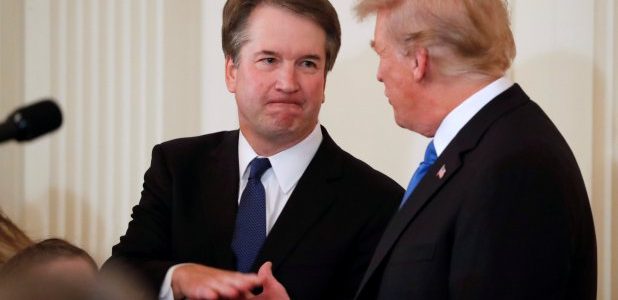
On Monday, July 10, 2018, President Donald Trump announced to the nation his choice for Justice Anthony Kennedy’s successor on the Supreme Court: Judge Brett Kavanaugh.
“We are very proud of President Trump’s decision to nominate Brett Kavanaugh,” said Mary Kate Knorr, executive director of Illinois Right to Life. “Judge Kavanaugh carries with him a strong professional record that displays a dedication to upholding the constitution and protecting life. It is our hope, that as successor to Justice Anthony Kennedy, he will bring a much needed voice, upholding the value and dignity of human life, to the Supreme Court.”
Since 2006, Judge Kavanaugh has served on the D.C. Circuit Court. Prior to this, Judge Kavanaugh served as staff secretary and senior associate counsel to President George W. Bush, and at one point he clerked for Justice Anthony Kennedy.
But why are we so hopeful and encouraged by President Trump’s Supreme Court pick?
First, take a look at his record.
In October of last year, Judge Kavanaugh wrote a dissenting opinion in Garza v. Hargan. The case involved a 17-year-old undocumented immigrant who was being held in a U.S. detention facility and was seeking an abortion. The question was, essentially, whether or not an immigrant minor in federal custody is entitled to an abortion on demand. Ultimately, the court sided with the detained minor (by association, her ACLU enablers), and she was allowed to have the abortion.
However, Judge Kavanaugh sternly rejected this. In his dissent, he actually cited Roe v. Wade. It’s important to understand within this context that Roe v. Wade may “protect” a woman’s choice to have an abortion, but it also protects the state’s interest in placing restrictions on abortion. Those “interests” include women’s health and, ultimately, the protection of human life (isn’t the U.S. government ironic?).
Judge Kavanaugh acknowledged this in his opinion, saying:
“The Government has permissible interests in favoring fetal life, protecting the best interests of a minor, and refraining from facilitating abortion.”
In addition, prominent pro-life powerhouse organization, Susan B. Anthony List, who also praised the nomination of Judge Kavanaugh, explained the importance of his role in another case. They explain:
“In Priests for Life v. HHS, Kavanaugh refused to apply Obamacare’s burdensome HHS abortifacient mandate to religious entities and was later vindicated by the Supreme Court. Kavanaugh wrote that the mandate regulations “substantially burden the religious organizations’ exercise of religion because the regulations require the organizations to take an action contrary to their sincere religious beliefs or else pay significant monetary penalties.”
Second, here’s what those who know him personally say.
Sarah E. Pitlyk, special counsel for the Thomas More Society and a former law clerk to Judge Kavanaugh, wrote in the National Review:
“On the vital issues of protecting religious liberty and enforcing restrictions on abortion, no court-of-appeals judge in the nation has a stronger, more consistent record than Judge Brett Kavanaugh. On these issues, as on so many others, he has fought for his principles and stood firm against pressure. He would do the same on the Supreme Court.”
Ed Meese, President Reagan’s Attorney General and close associate, has known Judge Kavanaugh for a very long time. He told Newsmax,
“I know him quite well, and I am impressed with Judge Kavanaugh and his fidelity to the Constitution, as shown in more than 300 opinions.”
What about that question from way back when?
It should be noted, some pro-lifers are expressing their concern over Judge Kavanaugh’s answer to a question asked by Senator Charles Schumer (D-NY) during his confirmation hearings for the U.S. Court of Appeals in the D.C. Circuit. During the hearing, Senator Schumer asked him, “Do you consider Roe v. Wade to be an abomination?” To this obviously provoking question, Judge Kavanaugh replied:
“If confirmed to the D.C. Circuit, I would follow Roe v. Wade faithfully and fully. That would be binding precedent to the Court. It’s been decided by the Supreme Court…it’s been reaffirmed many times.”
So why aren’t we worried?
First, as a principled jurist who recognizes that Supreme Court decisions would hold precedent over the decisions he made as a circuit court judge, he’s right. No decision by an appeals court could ever trump what has already been decided by the Supreme Court. That being said, Judge Kavanaugh not only “skirted” the actual question, but his answer was correct.
Second, as you continue to watch, you’ll hear Senator Charles Schumer repeatedly ask Judge Kavanaugh for his “own opinion” on the matter of Roe v. Wade. Judge Kavanaugh responds, “I don’t think it would be appropriate for me to give a personal view.” Once again – he’s right. Expressing his personal opinion on a decision would be inappropriate. Many experienced jurists would agree that opinions should only be given when the decision rests in your hands.
Third, the Washington Post makes an interesting and noteworthy observation:
“Kavanaugh has certainly ruled against abortion rights in given cases. But of the four finalists for this seat, he may be the most Collins- and Murkowki-friendly. Offering a similar response this time won’t cheer abortion opponents, but it could assure his confirmation.”
The confirmation process of the next Supreme Court Justice is going to be a grueling, but Judge Kavanaugh may be just the right fit for the fight.
Judge Kavanuagh is 53 years old, and is married, with two daughters. A practicing Catholic, Judge Kavanaugh is a lector at the Shrine of the Most Blessed Sacrament in Washington, D.C. and volunteers for Catholic Charities regularly.
Let’s have hope, and be encouraged!
